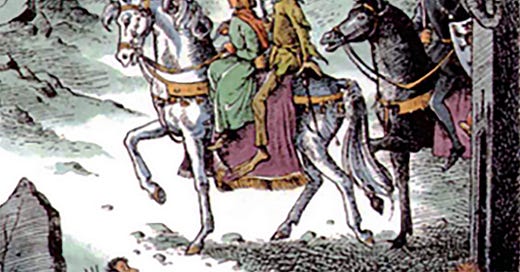The Silver Chair: Chapter 13 “ Underland Without the Queen”
C.S. Lewis Read-Along, Vol. 4, Issue 14
Background: Aslan’s sign of his presence, appearing on Rilian’s shield, was a good gift of grace shown after obedience had already begun. We can’t wait for a sign in the heavens to trust in God and follow Him. If the signs come at all, they often come after we take the first steps of obedience.
Quote:
“Doubtless,” said the Prince, “this signifies that Aslan will be our good lord, whether he means us to live or die. And all’s one, for that. Now, by my counsel, we shall all kneel and kiss his likeness, and then all shake hands with one another, as true friends that may shortly be parted. And then, let us descend into the city and take the adventure that is sent us.”
The Witch Queen has been defeated, but that does not mean Rilian, Puddleglum, Eustace, and Jill are safe. They aren’t home yet.
If you remember, throughout The Silver Chair, we’ve been tracking the use of the word “adventure.” Early on, Jill naively spoke of their being on an adventure. Here, Rilian rightly refers to their quest to leave the castle and return to Narnia as “the adventure that is sent us.”
Before they begin, however, they hear several noises at once—what seems like voices and a “steady roaring.” First, they see the Earthmen behaving like “people who don’t want to be seen,” so they assume they’re functioning as an army to enact revenge on them for killing the Queen. Second, they realize the sea is rising and flooding the city.
Puddleglum has an idea of what’s happening. “That Witch has laid a train of magic spells so that whenever she was killed, at that same moment her whole kingdom would fall to pieces,” he tells the others. “She’s the sort that wouldn’t so much mind dying herself if she knew the chap who killed her was going to be burned, or buried, or drowned five minutes later.”
Rilian recognizes this as the character of the Witch and the character of all evil. It’s why Jesus says the thief comes only to steal, kill, and destroy.1 There can be no negotiating with evil. As we talked about last week, we must kill sin and evil in our lives.
As gruesome as the beheading of the Queen-turned-snake may seem in a children’s book, it’s in line with older children’s stories like the Grimm’s Fairy Tales that depicted villains’ violent ends. The Silver Chair and all of Narnia, like J.R.R. Tolkien’s The Lord of the Rings, treat evil seriously and remind us that we should not toy with it.
The Queen cannot be reasoned with; she must be killed. The ring cannot be used for good purposes; it must be cast into Mount Doom and destroyed. One of the more shocking moments for me in reading Lewis comes in Perelandra when Ransom realizes he cannot simply argue and debate; he must kill the Unman in the body of Weston.
Our quartet from The Silver Chair prepares to leave the castle to confront the evil outside, and they realize they will not be going alone. Rilian’s formerly black shield has been transformed into silver with a figure of a lion, “redder than blood.” “Doubtless,” Rilian says, “this signifies that Aslan will be our good lord, whether he means us to live or die. And all’s one, for that.”
Keep reading with a 7-day free trial
Subscribe to The Wardrobe Door to keep reading this post and get 7 days of free access to the full post archives.





